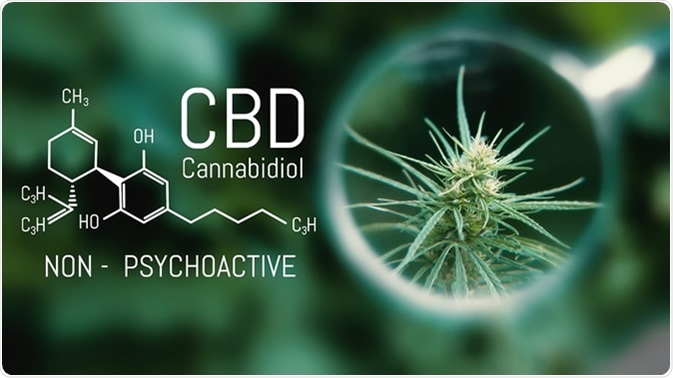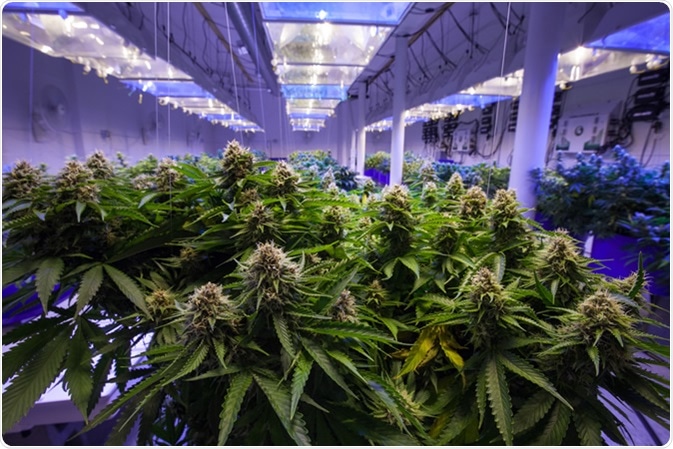Skip to:
The therapeutic effects of cannabinoids have been well-documented, but the effect of cannabinoids on the immune system is still not explored to a great extent. In a recent study, the researchers investigate the potential effects of the cannabinoids on inflammation and the mechanisms behind it.

Image Credit PRO Stock Professional / Shutterstock
The Therapeutic History of Cannabinoids
While cannabidiol, the pharmacologically active compound of the Cannabis species, was first isolated in 1940, it was used as a psychoactive drug only in the 1990s. Subsequently, extensive research has been performed to study the psychotropic effects of the drug. However, the effects of cannabinoids are not limited to the central nervous system. They can also affect the digestive, endocrine, and immune systems of the body. For example, previous studies show that cannabinoids can work as anti-inflammatory drugs, they can suppress the signaling of T cell receptors, induce apoptosis, lower the levels of pro-inflammatory cytokines, and act on macrophages. However, systematic studies on the same are lacking. Thus, in a recent study, the authors test the effect of various concentrations of CBD and its analog, DMH-CDB on the NF-kB activity. The authors test the potential mechanism behind this activity.

Commercial Cannabis growing operation. Image Credit: Canna Obscura / Shutterstock
The Experiment
For the study, the researchers used cannabinoids with 99.9% purity and which had no other cannabinoid present. The cannabinoids were solubilized in ethanol, RPMI-medium, and Cremaphor in equal ratios. The purity of CBD and DMH-CBD was assessed using gas chromatography-mass spectrometry (GS-MS). The analytes were also further derivatized to increase the efficiency and sensitivity of GS-MS.
Cannabinoids and TNF Production
Lipopolysaccharides can stimulate macrophages to produce TNF. However, when the same experiment was repeated after pre-treating the cells with CBD, both the production and release of CBD was reduced. The reduction was also in a concentration-dependent manner, showing the role of cannabinoids to control TNF production.
Cannabinoids and Cell Viability
One of the major regulators of the TNF production is NK-kB, so the authors speculated that CBD and its analog could influence the TNF production by influencing NF-kB. To test this, the authors used macrophages that express a reporter tagged to Nf-kB to visualize its levels. The cells were then pretreated with CBD and DMH-CBD and then stimulated with lipopolysaccharide. Pretreatment with CBD and its analog could reduce the levels of NF-kB, suggesting that the cannabinoids were indeed acting through the NF-kB pathway.
It is also known that cannabinoids can induce apoptosis. Thus, the researchers wanted to test if the cannabinoids were reducing NF-kB due to induction of apoptosis or an independent pathway. They found that while the effect of CBD to reduce NF-kB activity was related to its effects on macrophage viability, the effects of DMH-CBD on Nf-kB were independent of its role in cell death.
DMH-CBD and TNF Production
The authors found that while DMH-CBD also inhibits TNF production and activation of NF-kB, this reduction was not related to the Toll-like Receptor 2 pathway, unlike CBD. The activation of NF-kB can be mediated via two steps: IkBα, an inhibitory molecule, is bound to Kf-kB. When this molecule is degraded, it is transported to nuclear via Nuclear Localisation Sequence. Experiments showed that DMH-CBD did not affect the first step of Nf-kB activation, the degradation of the IkBα or the second step of nuclear translocation. Instead, DMH-CBD reduced the Nf-kB activity via the activation of A2A receptors. In the presence of a A2A receptor antagonist, the effects of DMH-CBD on NF-kB activation could be completely reversed.
Thus, cannabinoids, CBD and DMH-CBD inhibit the NF-kB, but in different ways. The mechanism of CBD is related to its effects on cell viability, while the effects of DMH-CBD are via the activation of A2A receptors.
Sources
- Silva et al. (2019) DMH-cannabidiol, a cannabidiol analog with reduced cytotoxicity, inhibits TNF production by targeting NF-kB activity by activating A2A receptor and inhibiting p38. Toxicology and Applied Pharmacology (https://doi.org/10.1016/j.taap.2019.02.011)
Further Reading
Last Updated: Aug 23, 2019